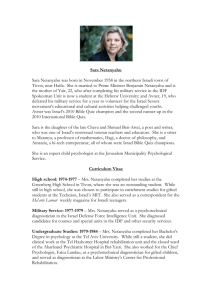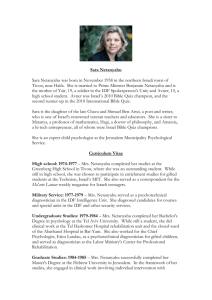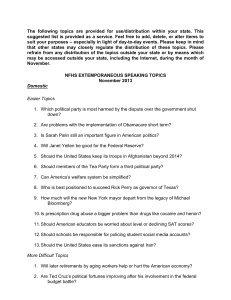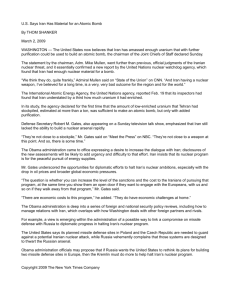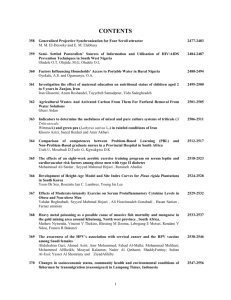Isreal Fears, Amalek`s Arsenal
advertisement
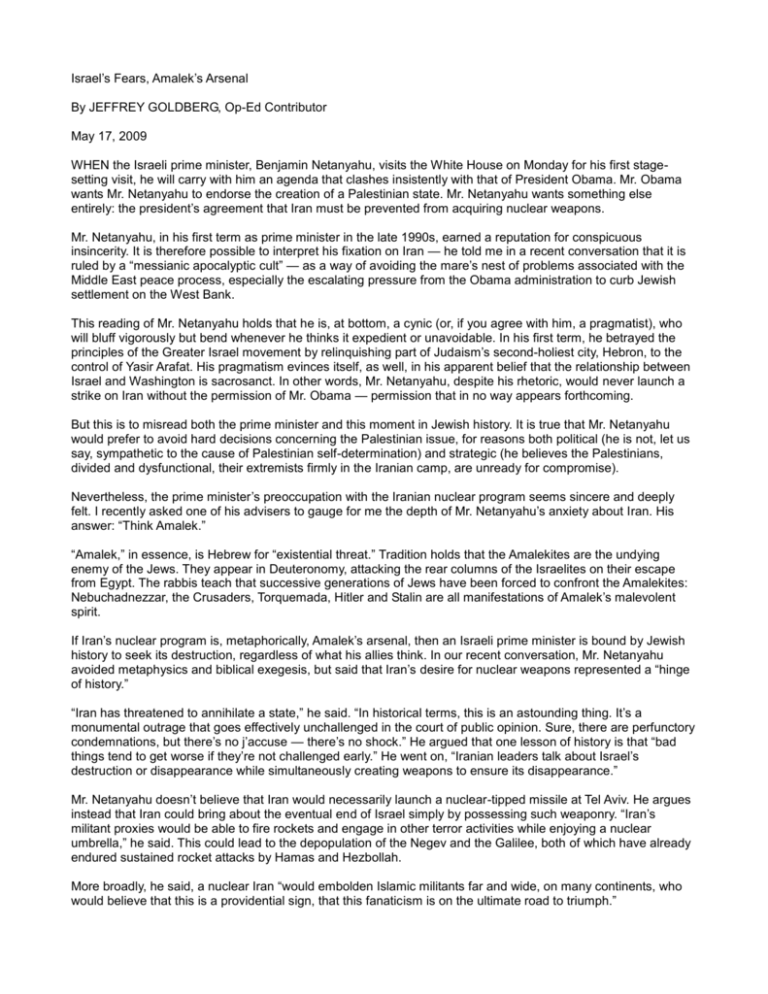
Israel’s Fears, Amalek’s Arsenal By JEFFREY GOLDBERG, Op-Ed Contributor May 17, 2009 WHEN the Israeli prime minister, Benjamin Netanyahu, visits the White House on Monday for his first stagesetting visit, he will carry with him an agenda that clashes insistently with that of President Obama. Mr. Obama wants Mr. Netanyahu to endorse the creation of a Palestinian state. Mr. Netanyahu wants something else entirely: the president’s agreement that Iran must be prevented from acquiring nuclear weapons. Mr. Netanyahu, in his first term as prime minister in the late 1990s, earned a reputation for conspicuous insincerity. It is therefore possible to interpret his fixation on Iran — he told me in a recent conversation that it is ruled by a “messianic apocalyptic cult” — as a way of avoiding the mare’s nest of problems associated with the Middle East peace process, especially the escalating pressure from the Obama administration to curb Jewish settlement on the West Bank. This reading of Mr. Netanyahu holds that he is, at bottom, a cynic (or, if you agree with him, a pragmatist), who will bluff vigorously but bend whenever he thinks it expedient or unavoidable. In his first term, he betrayed the principles of the Greater Israel movement by relinquishing part of Judaism’s second-holiest city, Hebron, to the control of Yasir Arafat. His pragmatism evinces itself, as well, in his apparent belief that the relationship between Israel and Washington is sacrosanct. In other words, Mr. Netanyahu, despite his rhetoric, would never launch a strike on Iran without the permission of Mr. Obama — permission that in no way appears forthcoming. But this is to misread both the prime minister and this moment in Jewish history. It is true that Mr. Netanyahu would prefer to avoid hard decisions concerning the Palestinian issue, for reasons both political (he is not, let us say, sympathetic to the cause of Palestinian self-determination) and strategic (he believes the Palestinians, divided and dysfunctional, their extremists firmly in the Iranian camp, are unready for compromise). Nevertheless, the prime minister’s preoccupation with the Iranian nuclear program seems sincere and deeply felt. I recently asked one of his advisers to gauge for me the depth of Mr. Netanyahu’s anxiety about Iran. His answer: “Think Amalek.” “Amalek,” in essence, is Hebrew for “existential threat.” Tradition holds that the Amalekites are the undying enemy of the Jews. They appear in Deuteronomy, attacking the rear columns of the Israelites on their escape from Egypt. The rabbis teach that successive generations of Jews have been forced to confront the Amalekites: Nebuchadnezzar, the Crusaders, Torquemada, Hitler and Stalin are all manifestations of Amalek’s malevolent spirit. If Iran’s nuclear program is, metaphorically, Amalek’s arsenal, then an Israeli prime minister is bound by Jewish history to seek its destruction, regardless of what his allies think. In our recent conversation, Mr. Netanyahu avoided metaphysics and biblical exegesis, but said that Iran’s desire for nuclear weapons represented a “hinge of history.” “Iran has threatened to annihilate a state,” he said. “In historical terms, this is an astounding thing. It’s a monumental outrage that goes effectively unchallenged in the court of public opinion. Sure, there are perfunctory condemnations, but there’s no j’accuse — there’s no shock.” He argued that one lesson of history is that “bad things tend to get worse if they’re not challenged early.” He went on, “Iranian leaders talk about Israel’s destruction or disappearance while simultaneously creating weapons to ensure its disappearance.” Mr. Netanyahu doesn’t believe that Iran would necessarily launch a nuclear-tipped missile at Tel Aviv. He argues instead that Iran could bring about the eventual end of Israel simply by possessing such weaponry. “Iran’s militant proxies would be able to fire rockets and engage in other terror activities while enjoying a nuclear umbrella,” he said. This could lead to the depopulation of the Negev and the Galilee, both of which have already endured sustained rocket attacks by Hamas and Hezbollah. More broadly, he said, a nuclear Iran “would embolden Islamic militants far and wide, on many continents, who would believe that this is a providential sign, that this fanaticism is on the ultimate road to triumph.” To understand why Mr. Netanyahu sees Iran as a new Amalek, it is essential to understand two aspects of his intellectual and emotional development: The scholarship of his father, and the martyrdom of his older brother. His father, Benzion Netanyahu, 99, is a pre-eminent historian of Spanish Jewry. “The Origins of the Inquisition in 15th-Century Spain,” his most notable book, toppled previously held understandings of the Inquisition’s birth. Over more than 1,300 pages, Benzion Netanyahu argued that Spanish hatred of Jews was not merely theologically motivated but based in race hatred (the Spanish pursued the principle of limpieza de sangre, or the purity of blood) that reached back to the ancient world. The elder Netanyahu also argued that efforts by the Jews of Spain to accommodate their adversaries were futile, in part because the charges against them were devoid of logic or fact, and, perhaps most important, because the written or spoken expression of Jew hatred (his preferred term for anti-Semitism) inevitably led to physical persecution. “What emerges from our survey,” he wrote, “is that the Spanish Inquisition was by no means the result of a fortuitous concourse of circumstances and events. It was the product of a movement that called for its creation and labored for decades to bring it about.” A close reading of Benzion Netanyahu suggests a belief that anti-Semitism is a sui generis hatred, one that is shape-shifting, impervious to logic and eternal. The only rational response to such sentiment, in the Netanyahu view, is militant Jewish self-defense. Benjamin Netanyahu and his two brothers were raised in a home darkened by the history of the Inquisition, and they were taught Benzion’s understanding of the consequences of Jewish weakness. In his 1993 book, “A Place Among the Nations,” Benjamin Netanyahu wrote about what he saw as one of the miracles of the Zionist revolution: “The entire world is witnessing the historical transformation of the Jewish people from a condition of powerlessness to power, from a condition of being unable to meet the contingencies of a violent world to one in which the Jewish people is strong enough to pilot its own destiny.” If his father provided Mr. Netanyahu with his historical framework, his brother Yonatan bequeathed on him the model of a Jew who devoted his spirit to the cause of his people’s survival. Yonatan, who was killed while leading the 1976 raid on the Entebbe airport in Uganda to free Israeli captives of Arab and German hijackers, is perhaps the most venerated figure in the post-Warsaw Ghetto Jewish martyrology, mainly because Entebbe still symbolizes the purest expression of the modern Jewish rejection of passivity. Friends and advisers say Benjamin Netanyahu took three lessons from his brother’s death: The first is that those who threaten Jews, and have the means to carry out their threats, should be neutralized pre-emptively. The second is that no one will defend the Jews except the Jews themselves. The third is that destiny has chosen the Netanyahus to expose and battle anti-Semitism — before it reaches the point of genocide. In his eulogy for Yonatan Netanyahu, Shimon Peres, then Israel’s defense minister, said: “There are times when the fate of an entire people rests on a handful of fighters and volunteers. They must secure the uprightness of our world in one short hour. In such moments, they have no one to ask, no one to turn to. The commanders on the spot determine the fate of the battle.” BENJAMIN Netanyahu faces the daunting task of maintaining Israel’s relationship with the United States, while at the same time forestalling Iran’s nuclear program. If Iran gains nuclear capacity, Israel will have judged him a failure as prime minister; if he does serious damage to his country’s standing in Washington, he will have failed as well. Mr. Netanyahu may be able to convince Mr. Obama that Iran poses an Amalek-sized threat to Israel, but he will have a much more difficult time convincing him that Iran poses an existential threat to America. It is certainly true that a nuclear Iran is not in the best interests of the United States. It would mean, among other things, the probable beginning of a nuclear arms race in the world’s most volatile region, and it would mean that the 30year-struggle between America and Iran for domination of the Persian Gulf will be over, with Persia the victor. But the short-term costs, in particular, for an American strike — or an American-approved Israeli strike — could be appallingly high. As the crisis worsens, Mr. Obama will find his options few, and those that exist will require him to bring to bear all his talents of persuasion. In his effort to engage Iran, he will need to promise a complete end to its international isolation in exchange for a halt to its nuclear program. But at the same time, he must be ready to threaten Iran with total estrangement from the West — the limiting of its gas imports, the choking-off of its banking system — if it continues its nuclear program. To do this, he must convince Europe, China and Russia that a nuclear Iran will be catastrophic for Middle East stability as well as for their own economies. If he’s unwilling to take military action against Iran, President Obama might soon enough be forced to design a containment strategy meant to scare a nuclear Iran into something resembling quiescence. Talk of containing Iran after it acquires a nuclear capacity, however, does not make the Israelis (or Iran’s Arab adversaries, for that matter) happy and, in fact, might push them closer to executing a military strike. The president, who has shown he understands the special dread Israelis feel about their precarious existence, surely knows this. Last year, during his campaign, he told me, “I know that that there are those who would argue that in some ways America has become a safe refuge for the Jewish people, but if you’ve gone through the Holocaust, then that does not offer the same sense of confidence and security as the idea that the Jewish people can take care of themselves no matter what happens.” Mr. Netanyahu says he supports Mr. Obama’s plan to engage the Iranians. He also supports the tightening of sanctions on the regime, if engagement doesn’t work. But there should be little doubt that, by the end of this year, if no progress is made, Mr. Netanyahu will seriously consider attacking Iran. His military advisers tell me they believe an attack, even an attack conducted without American help or permission, would have a reasonably high chance of setting back the Iranian program for two to five years. Around the world, this would be an extraordinarily unpopular step, but Mr. Netanyahu knows he would have much of the Israeli public behind him. Even the man who delivered the eulogy at his brother’s funeral, the far more dovish Shimon Peres, has assimilated the lessons Benzion taught his sons. When I visited recently with Mr. Peres, who is now Israel’s president, I asked him if there is a chance that his country has over-learned the lessons of Jewish history. He answered, “If we have to make a mistake of overreaction or underreaction, I think I prefer the overreaction.” Jeffrey Goldberg, a national correspondent for The Atlantic, is the author of “Prisoners: A Story of Friendship and Terror.” Copyright 2009 The New York Times Company
